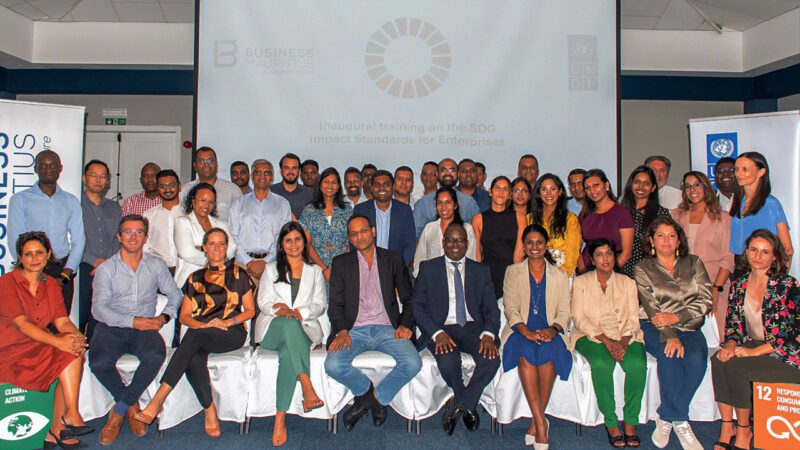The Algorithmic Classroom
South Korea’s ambitious experiment with AI in classrooms holds lessons for the world
The SDG Impact Standards' role in shaping sustainable futures

Climate change, inequality, and other global challenges are putting a strain on our planet and its people. The private sector has a critical role to play in addressing these challenges, and the SDG Impact Standards are a powerful tool that can help businesses make a positive impact.
This transformative approach is exemplified by a groundbreaking partnership between the United Nations Development Programme (UNDP) and Business Mauritius, which is pioneering the integration of these SDG Impact Standards into business practices across Africa. This collaboration marks a significant stride towards embedding the Sustainable Development Goals (SDGs) into the core of private sector operations, aiming to set a precedent for sustainable business practices worldwide.
The urgency of integrating SDGs into business operations cannot be overstated. With global challenges like climate change and inequality escalating, the private sector plays a pivotal role in driving the change needed to achieve a sustainable and equitable future. The SDG Impact Standards emerge as a beacon of hope, offering a comprehensive framework for businesses to align their strategies, operations, and reporting with the SDGs.

At their core, the SDG Impact Standards provide a holistic approach to sustainability, bridging the gap between existing frameworks and the unique needs of businesses striving for positive social and environmental impact. Unlike traditional models focused solely on financial returns, these standards advocate for a balanced consideration of social, environmental, and economic outcomes. This inclusive approach encourages businesses to innovate and reimagine their impact on the world.
A pivotal moment in the journey towards sustainable business practices in Africa was marked by the joint training event, “The SDG Impact Standards for Enterprises,” held in Mauritius. This event, spearheaded by the UNDP and Business Mauritius, was not just a training session; it was a transformative experience for approximately 50 enterprises from Mauritius and later, The Seychelles.
The training was part of a broader ambition to scale up the rollout and adoption of the SDG Impact Standards, aiming to engrain the SDGs at the core of private value creation. Through this initiative, businesses were encouraged to undertake a transformational shift in mindset and decision-making towards sustainability.

Inaugural Training on SDG Impact Standards in Mauritius – Courtesy of UNDP
The training course was meticulously designed to prepare businesses for a comprehensive understanding and implementation of the SDG Impact Standards. Participants were required to complete preparatory courses, including the UNDP-DUKE course on Impact Measurement and Management (IMM) for the SDGs, and familiarize themselves with the SDG Impact Standards documents and self-assessment tools.
Over three full days, the training navigated through various learning objectives and guiding questions, tailored to ensure participants not only grasped the theoretical underpinnings of the standards but also understood how to apply them in real-world scenarios. The curriculum was delivered through a compact, in-depth training module comprising 300 slides, focusing on teams within companies responsible for implementing the SDG Standards. Despite the training’s intensive nature, the feedback highlighted the need for spreading such sessions over several weeks to mitigate the high opportunity costs involved.

Port Louis, Mauritius
One of the major challenges identified was convincing potential clients of the tangible benefits of adopting these standards for their business sustainability. To address this, an Applied Research Project (ARP) at the Graduate Institute Geneva, commissioned by 4IP Group LLC, is exploring optimal pricing mechanisms for SME founders, acknowledging that willingness and ability to pay are significant barriers to adoption.
Moreover, the training underscored the importance of involving decision-makers directly in these sessions to foster a culture of internal champions for the standards. Despite some trainers struggling to attract these key figures to training sessions, the aspiration remains to turn them into intrapreneurs who advocate for the standards within their organizations.
The initiative in Mauritius and The Seychelles represents a critical step forward in the African continent’s journey towards sustainable business practices. By equipping businesses with the knowledge and tools to integrate the SDG Impact Standards into their operations, this training paves the way for a future where businesses contribute meaningfully to the SDGs, driving economic growth, job creation, and sustainable development across the region.
The adoption of the SDG Impact Standards is more than a business imperative; it’s a commitment to building a more sustainable, equitable, and prosperous world. By aligning operations with these standards, businesses can contribute to the achievement of the SDGs, unlocking significant economic opportunities and fostering a better future for all.
—
The author wishes to thank the 14 program trainees who provided source material for this article.
Related Content
Comments
Deep Dives

Featuring
Clarisse Awamengwi
IE Correspondent
July 17 - 12:00 PM EST

Featuring
Russell McLeod
July 24 - 12:00 PM EST
RECENT
Editor's Picks
Webinars
News & Events
Subscribe to our newsletter to receive updates about new Magazine content and upcoming webinars, deep dives, and events.
Become a Premium Member to access the full library of webinars and deep dives, exclusive membership portal, member directory, message board, and curated live chats.
At Impact Entrepreneur, we champion fearless, independent journalism and education, spotlighting the inspiring changemakers building the Impact Economy. Diversity, equity, sustainability, and democracy face unprecedented threats from misinformation, powerful interests, and systemic inequities.
We believe a sustainable and equitable future is possible—but we can't achieve it without your help. Our independent voice depends entirely on support from changemakers like you.
Please step up today. Your donation—no matter the size—ensures we continue delivering impactful journalism and education that push boundaries and hold power accountable.
Join us in protecting what truly matters. It only takes a minute to make a real difference.
0 Comments